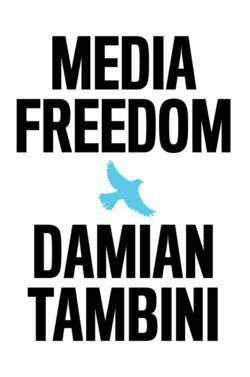Читать книгу Media Freedom - Damian Tambini - Страница 7
Introduction
ОглавлениеDemocracy looks shaky. As the world faces a succession of global crises, even advocates of plural, multi-party politics are asking whether citizens can be trusted to select the right representatives to confront those crises, and if publics are capable of deliberating fair and effective policies to surmount them.
Many identify the roots of our democratic tribulations in a crisis in our media: citizens have lost trust in common facts and authoritative voices, which are drowned out by the noise and distraction of the internet. Democratic self-confidence has evaporated as populists both within and outside democracies seek to control media, and construct new tools of targeted propaganda.
The liberal democratic polity based the legitimacy of collective decision-making on a notion of individual liberty and rationality. The media were free as long as they operated according to an ethics of truth, and broadly served democratic government. Democracy was inconceivable without free media, but the media trod a fine line: for the right they were a liberal conspiracy, and for the left a hegemony of the powerful. The legitimacy of the entire system rested on the ability of the media to marshal sufficient trust in the fairness of the democratic game, and the ethical basis of their own craft. This in turn rested on a social compact of rights and freedoms. Media privileges and protections – including media freedom itself – were in theory, and to an extent in practice, based on self-regulated ethical responsibilities to truth, fairness and accuracy in reporting.
Whether media ever were responsible was constantly in dispute. However imperfect they were, democratic media systems are breaking down, and they threaten to take with them the rational basis of democratic politics.
The work of rebuilding media institutions is under way, but it is stalled, blocked by a predictable compound of interests: the new tech giants locked in a lobbying battle against a new regulatory settlement, and the old media, clinging on to their status as the watchdogs of democracy, but denuded of the resources to meet the obligations this entails. Each protagonist claims the mantle of liberty to defend their interests, and democratic politicians seek their own advantages, without a long-term plan for how to fashion a more adequate deliberative apparatus for the post-broadcast era.
This book offers a theory of how a new approach to media freedom can guide reform of media governance and legal judgements on freedom of expression. Popular consent, civil society and genuine public deliberation are evasive phantoms: as recent elections have shown, trust and the minimal consensus over facts can fracture if citizens perceive that the information they receive is controlled, or ‘fake’. Provision of ‘authoritative’ facts and opinions usually backfires if publics doubt the motives or interests behind them. Only an autonomous, decentralized media system can provide democracy with an information quality filter that is rightly trusted. Because that media system cannot be entirely free, but is threatened at every turn by constraint, its regulation must be based on an explicit and agreed set of principles.
The first stage in a mature theory of media freedom is to reject the ideology that free and effective democratic communication can be served by unconstrained liberty to publish. Communication depends on rules and institutions and resources, whether these are provided by languages, grammars, codes, principles, laws, subsidies or management of the airwaves. Once it is accepted that the libertarian ideal of no rules, or the rule of the market, is an illusion, the debate can start about whose rules, which rules, and whether liberal democracy requires a specific regime of rights and privileges for mediating institutions of communication. This book argues that it does, and that we need to learn from the history of broadcasting and the press in order to ascertain what the key values and principles should be, as well as what they should not be. Without such a theory, which draws on the past of press and broadcasting liberty, and also looks to the future of internet governance, constitutional principles of communication in the democratic state will lack coherence, continuity and legitimacy.
This book argues that we need to revisit the legal doctrines and philosophical principles of press, broadcasting and media freedom in order to build a new approach to democratic communication that runs with the grain of the history of press and speech freedom. In order to understand and resolve the conflicts and fissures in contemporary approaches to media freedom, we need to understand more about their origins. It is necessary to excavate the reasoning that lies beneath the principles that have been sedimented in law and policy over centuries.
This book shows that the law and philosophy of media freedom are in danger of becoming further polarized, between a global human rights system in which media enjoy conditional freedoms as institutions, and are able to claim special privileges in return for the ethical function they fulfil, and the exceptionalism of a United States rightly proud of its unparalleled global leadership of media freedom, and wedded to a ‘marketplace of ideas’ ideal of stateless communication. The time has come for an accommodation between the US and the global human rights system. Liberal democracy can no longer afford the luxury of disunity.
Media systems are in turmoil. They will be reconstructed through a wide range of interrelated policy debates which can be made coherent through a common set of normative principles based on existing rights. The system of international human rights has already developed a template for media freedom as a fundamental right, but more needs to be done to align democracies with these core principles. Liberal democracies must agree a core theory of media freedom in order to proceed with institutional renewal. This book outlines this theory.
